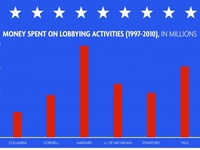“The voices that represent Harvard are actually a part of Harvard,” Casey said.
During fiscal year 2009, Harvard reported that it lobbied on a variety of issues, including legislation affecting intellectual property law, legislation funding stem cell research and therapeutic cloning, appropriations for student financial aid, and science funding from organizations such as the National Institutes of Health and the National Science Foundation.
Earlier this year Harvard also lobbied for the Development, Relief, and Education for Alien Minors Act, Perkins Loans, and tuition tax credits, among other issues.
In fiscal year 2009, the University spent a total $465,946 on lobbying activities. This represents a modest decrease from previous years during which the University spent $578,480 in fiscal year 2008, and $697,700 in 2007. Casey said he believes fluctuations in spending were a function of heightened political activity during those years rather than University budget reductions.
In fiscal year 2009, $238,696—over half of the total spending—was used for “direct contact with legislators, their staff, government officials, or a legislative body,” which include Faust’s visits with politicians in Washington but not her contact with journalists, business leaders, or other Washington heavyweights.
According to the Sunlight Foundation, a government watchdog group, Harvard has spent a total of $7.8 million on lobbying from 1997-2010.
Among its peers, Harvard is one of the biggest spenders on lobbying activity. During the same time period, Yale spent a little over $6 million, Stanford spent $3.9 million, and Columbia spent $2.2 million on lobbying activities.
Those dollars pay for a big presence—but they cannot buy everything.
PROMOTING THE DREAM
After Eric Balderas ’13 tried to board a plane in San Antonio using a Mexican consular card and his Harvard ID, he was detained by the authorities as an undocumented immigrant—and with his arrest Harvard became a player on the frontlines of the debate over whether undocumented youth like Balderas should be granted a path to citizenship.
The University adopted Balderas’ case as its own as a Harvard Law School professor agreed to represent him and Faust held him up to Congressmen as an example of why such students ought to be granted the opportunity to gain citizenship.
Faust led the charge among university presidents to advocate for the DREAM Act—one example of the way that she has pushed for a more activist role in Washington. Though immigrant rights activists mounted a major campaign to push the law through the Senate, it would stall after failing to garner sufficient conservative support.
But when Faust travels to Washington to advocate on behalf of a specific piece of legislation it also raises questions about when it is appropriate to put the Harvard imprimatur on certain policies, an issue that was particularly present in lobbying for the DREAM Act.
Some argued that lobbying for the DREAM Act overstepped the role of the president because it benefitted a group not directly tied to Harvard—but rather a limited population of potential Harvard students—and because it was a highly partisan issue backed heavily by Democrats.
But Durbin, who authored the DREAM Act and met with Faust on the issue, said he believes her endorsement is an important step in garnering broad support for the legislation.
Read more in News
Serving the Community?













